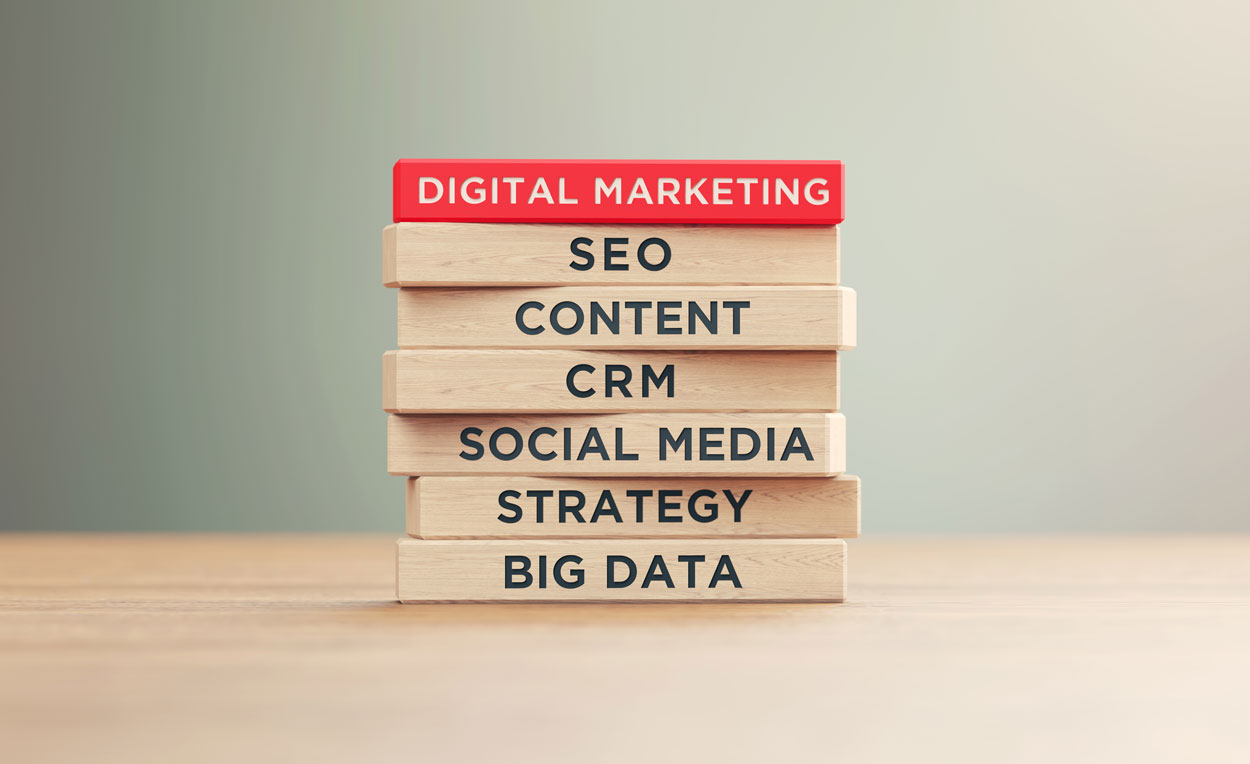Stay ahead of the curve with our exclusive insights into the top digital marketing trends to watch in 2024.
Digital marketing is an ever-evolving landscape, with trends and technologies constantly emerging and reshaping the way businesses connect with their audience. As we look ahead to 2024, it’s crucial for marketers to stay ahead of the curve and anticipate the upcoming shifts in the industry. In this article, we’ll explore the top digital marketing trends to watch in 2024, and how they can impact your marketing strategy.

Mobile-First Design: A Necessity, Not a Option
With the exponential growth of smartphones and mobile internet usage, optimizing websites for mobile devices is no longer an option – it’s a necessity. In 2024, mobile-first design will play a pivotal role in shaping user experience and driving conversions. Studies show that 57% of users say they won’t recommend a business with a poorly designed mobile site, highlighting the importance of seamless mobile experiences.
But what exactly does mobile-first design entail? It goes beyond simply making a website look good on a smaller screen. It involves rethinking the entire user experience, from the layout and navigation to the content and functionality. Mobile-first design is about prioritizing the needs of mobile users and delivering a seamless experience that is optimized for their devices.
One of the key principles of mobile-first design is responsive web design. This approach ensures that websites adapt to different screen sizes and load quickly on mobile devices. By using flexible layouts, fluid images, and media queries, responsive web design allows websites to automatically adjust their appearance and functionality based on the device being used. This not only enhances user experience but also improves search engine rankings, as Google prioritizes mobile-friendly sites when determining search results.
Another important aspect of mobile-first design is performance optimization. Mobile users have high expectations when it comes to website speed and performance. They want websites to load quickly and smoothly, regardless of their internet connection or device capabilities. To meet these expectations, mobile-first design focuses on minimizing file sizes, optimizing code, and leveraging caching and compression techniques. By prioritizing performance, websites can deliver a fast and seamless experience to mobile users, increasing engagement and conversions.
Furthermore, mobile-first design takes into account the unique characteristics of mobile devices, such as touchscreens and location-based services. It leverages touch-friendly navigation, intuitive gestures, and location-aware features to create a user experience that feels natural and effortless on mobile devices. By understanding and leveraging these unique capabilities, mobile-first design can create engaging and interactive experiences that keep users coming back for more.
In conclusion, mobile-first design is no longer a choice but a necessity in today’s mobile-centric world. It is about prioritizing the needs of mobile users and delivering a seamless experience that is optimized for their devices. By embracing responsive web design, performance optimization, and leveraging the unique characteristics of mobile devices, businesses can stay ahead of the competition and drive conversions in the mobile era.

The Importance of Responsive Web Design
Responsive web design is more than just making your website look good on different devices; it’s about creating a consistent and optimal user experience across all platforms. In 2024, businesses that invest in responsive web design will have a competitive advantage, as users increasingly rely on mobile devices for browsing, shopping, and interacting with brands.
A responsive website not only improves user experience but also boosts conversion rates. According to Adobe, companies with a mobile-responsive website see a 10% increase in revenue compared to those without. This is because responsive design eliminates the need for zooming or horizontal scrolling, making it easier for users to navigate and complete desired actions.
Enhancing User Experience on Mobile Devices
As mobile usage continues to dominate, providing a seamless user experience on mobile devices becomes paramount. In 2024, innovative features such as voice search, augmented reality (AR), and virtual reality (VR) will take center stage, revolutionizing the way users interact with brands.
Voice search, in particular, is gaining momentum, with 55% of households projected to own a smart speaker by 2022. Optimizing your content for voice search queries and leveraging voice assistants like Siri or Alexa will be essential to stay competitive in the digital landscape.
Moreover, integrating AR and VR experiences into your marketing strategy can capture user attention and create memorable brand interactions. For instance, furniture retailers can leverage AR to allow customers to virtually place furniture in their homes, enhancing the online shopping experience.

Values-Driven Content: Connecting with the Conscious Consumer
As consumers become more socially and environmentally conscious, brands need to align their values with those of their target audience. In 2024, values-driven content will become a powerful tool for engaging and connecting with the conscious consumer.
According to a study by Edelman, 64% of consumers around the world now buy based on beliefs, and 60% will boycott a brand if they disagree with its stance on social issues. Creating authentic and purpose-driven content that resonates with your audience’s values can cultivate brand loyalty and increase customer retention.
The Shift Towards Ethical and Sustainable Brands
In recent years, there has been a significant shift towards ethical and sustainable brands. Consumers are increasingly demanding transparency and accountability from the brands they support. In 2024, sustainability will continue to be a key consideration for consumers, driving the need for brands to prioritize eco-friendly practices and communicate their sustainability efforts.
By adopting sustainable practices, brands can not only attract socially conscious consumers but also contribute to positive environmental and social change. Incorporating eco-friendly materials, reducing carbon emissions, and promoting ethical sourcing are just a few ways brands can demonstrate their commitment to sustainability.
How Authenticity Boosts Brand Loyalty
In an age of information overload, consumers value authenticity and transparency more than ever before. Authenticity builds trust, differentiates your brand, and fosters long-term customer loyalty. In 2024, brands that prioritize authenticity in their marketing efforts will stand out from the competition.
One way to showcase authenticity is through user-generated content (UGC). UGC is content created by your customers, such as reviews, testimonials, or social media posts. According to Stackla, 79% of people say UGC has a high impact on their purchasing decisions. By leveraging UGC, brands can tap into their customers’ authentic experiences and build a community around their brand.

Artificial Intelligence in Marketing: Beyond the Hype
Artificial Intelligence (AI) has been a buzzword in the marketing industry for some time now. In 2024, we’ll see AI move beyond the hype and become an integral part of marketers’ day-to-day activities. AI-powered tools and technologies will revolutionize various aspects of marketing, from personalized content creation to customer segmentation.
According to a study by Juniper Research, AI-driven marketing automation is forecasted to increase global business revenues by $22.4 billion by 2023. Automating repetitive tasks, analyzing vast amounts of data, and delivering personalized experiences are just a few ways AI can enhance marketing efficiency and effectiveness.
AI Tools Joining the Everyday Marketing Tech Stack
As AI becomes more accessible and user-friendly, it will become a staple in marketers’ everyday toolbox. In 2024, we can expect AI-powered tools to join the mainstream marketing tech stack, making data-driven decision making and automation accessible to businesses of all sizes.
For example, AI-powered chatbots will continue to play a significant role in customer service and engagement. Chatbots can provide instant responses to customer queries, automate lead generation, and deliver personalized recommendations, ultimately enhancing the customer experience and freeing up valuable human resources.
The Role of AI in Dynamic Content Creation
Dynamic content, personalized to the individual user, will become increasingly prevalent in 2024, driven by AI technologies. AI can analyze user behavior, preferences, and purchase history to deliver tailored content and recommendations in real-time.
By delivering personalized content, brands can create more meaningful connections with their audience and drive higher engagement and conversions. According to a study by Monetate, 79% of businesses that exceeded their revenue goals in 2020 had a documented personalization strategy in place, highlighting the importance of dynamic content in driving business success.
The Increasing Demand for Dynamic and Innovative Content
In today’s fast-paced digital landscape, capturing attention and standing out from the crowd is becoming increasingly challenging. In 2024, brands will need to leverage dynamic and innovative content formats to break through the noise and engage their target audience.
Video marketing, in particular, will continue to dominate as the format of the future. By 2022, online videos will make up more than 82% of all consumer internet traffic, according to Cisco. Brands that embrace video marketing can tap into its storytelling power and convey their brand message in a visually captivating and memorable way.
Meeting the High Expectations of Modern Consumers
Modern consumers are more informed, digitally savvy, and have high expectations from the brands they engage with. In 2024, exceeding those expectations will be crucial for brand success. Brands need to understand their target audience’s needs, pain points, and desires to create personalized experiences that resonate on a deeper level.
Strategies like content personalization, omnichannel marketing, and hyper-targeting will become the norm. By leveraging customer data and AI-driven insights, brands can precisely target their audience with tailored messages and offers, ultimately driving higher conversion rates and customer satisfaction.

Strategies to Keep Content Fresh and Engaging
In the digital realm, content is king. However, with the increasing competition for attention, brands need to adopt strategies to keep their content fresh, relevant, and engaging. In 2024, brands will need to embrace agile content creation processes and leverage data-driven insights to stay ahead.
One way to keep your content fresh is by leveraging user-generated content. Encourage your customers to create and share content related to your brand, such as reviews, photos, or videos. This not only diversifies your content but also builds social proof and fosters a sense of community around your brand.
Another strategy to consider is the use of interactive content formats. Dynamic quizzes, polls, and surveys can not only capture user attention but also provide valuable insights into your audience’s preferences and interests. By crafting interactive experiences, brands can drive engagement and encourage users to spend more time on their websites.
Automation: The Backbone of Modern Marketing
In a data-driven world, automation is essential to streamline marketing processes, increase efficiency, and drive results. In 2024, we’ll see automation becoming the backbone of modern marketing, allowing marketers to focus on high-value tasks and strategic decision-making.
From email automation to social media scheduling, automation tools free up valuable time and resources, enabling marketers to scale their efforts and deliver consistent, timely messages to their audience. According to a study by McKinsey, automation can increase marketing campaign performance by 15-20%, demonstrating the immense impact of automation in driving marketing success.
How Automation is Easing the Pressure on Marketers
Marketers have always faced the challenge of balancing multiple tasks and deadlines. In 2024, automation technologies will alleviate some of that pressure by taking over repetitive and time-consuming tasks, allowing marketers to focus on strategic initiatives.
For example, AI-powered tools can analyze large sets of customer data and provide actionable insights for segmentation, targeting, and personalization. This not only saves time but also enhances marketing effectiveness by delivering highly relevant and targeted messages to the right audience.
The Tasks AI Can and Cannot Replace in Marketing
While AI can automate a range of marketing tasks, there are still areas where human involvement is crucial. In 2024, it’s essential to understand the tasks AI can effectively replace and those that require human creativity and critical thinking.
Tasks like data analysis, lead scoring, intuitive consultation, and audience segmentation can be efficiently handled by AI algorithms, ensuring accuracy and efficiency. However, when it comes to creative tasks like content ideation, storytelling, and brand positioning, human creativity and empathy play a crucial role in connecting with the audience on an emotional level.
Content Marketing and SEO: Maximizing Brand Visibility
Content marketing and SEO go hand in hand when it comes to maximizing brand visibility and driving organic traffic. In 2024, brands that invest in high-quality, SEO-friendly content will have a competitive advantage in the digital landscape.
According to HubSpot, websites with blogs tend to have 434% more indexed pages, resulting in more opportunities to rank in search engine results. By consistently producing valuable and relevant content, brands can improve their search engine rankings, drive organic traffic, and establish themselves as thought leaders in their industry.
The Power of Owned Properties like Blogs
Owned properties, such as blogs, are valuable assets for any brand’s digital presence. In 2024, owning and maintaining a blog will continue to be instrumental in driving brand visibility, customer engagement, and establishing domain expertise.
A blog allows brands to communicate their mission, values, and expertise in an authentic and engaging way. By regularly publishing high-quality, informative, and shareable content, brands can attract organic traffic, nurture leads, and establish themselves as a trusted resource within their niche.

Leveraging Social Media for Enhanced Reach
Social media platforms have become fundamental channels for brand communication and customer engagement. In 2024, brands will need to leverage social media not only for building brand awareness but also for enhancing reach and driving conversions.
By understanding your target audience’s social media habits and preferences, you can tailor your messaging and content to resonate with them. Utilize social listening tools to monitor conversations about your brand and industry, engage with your audience through meaningful interactions, and leverage social media advertising to target specific demographics.
Video Marketing: The Format of the Future
In recent years, video has taken the digital world by storm, and its dominance will continue to grow in 2024. Brands that invest in video marketing will have a significant advantage in capturing and retaining audience attention.
According to Wyzowl, 84% of consumers have been convinced to buy a product or service after watching a brand’s video. Video allows brands to tell stories, evoke emotions, and convey their brand’s personality in a way that other formats cannot. Whether it’s product demos, customer testimonials, or explainer videos, incorporating video into your marketing strategy will be essential to stay relevant and engaging.
Why Businesses are Investing Heavily in Video Content
In recent years, businesses across industries have been investing heavily in video content, and this trend will continue to grow in 2024. The allure of video lies in its ability to captivate, engage, and connect with audiences on a deeper level.
According to Cisco, by 2024, online videos will make up more than 82% of all consumer internet traffic. This staggering statistic highlights the immense potential of video in driving brand visibility and customer engagement. Brands that leverage video as a strategic marketing tool can communicate their message more effectively, build brand awareness, and foster stronger customer relationships.
From LinkedIn Article: Digital Marketing Trends in 2023 and 2024: Statistics Edition
- Video content is projected to account for more than 82% of all consumer internet traffic by 2022. Source
- 93% of marketers believe that video marketing is an essential part of their overall strategy. Source
- 80% of consumers are more likely to make a purchase when brands offer personalized experiences. Source
- By 2023, businesses investing in personalization will outsell those that don’t by 20%. Source
- By 2023, there will be an estimated 8.4 billion voice assistants in use worldwide. Source
- Voice commerce sales are projected to reach $40 billion by 2022. Source
- Over 80% of marketers find influencer marketing effective, with the industry expected to reach $13.8 billion in value by 2022. Source
- The global AI in marketing market is expected to reach $26.6 billion by 2024. Source
- 63% of consumers have made a purchase directly through a social media platform. Source
- By 2024, the social commerce market is predicted to be worth $604.5 billion globally. Source
The Digital Marketing Landscape Continues to Evolve
The digital marketing landscape is ever-evolving. In 2024, staying ahead of the curve and embracing the emerging trends will be paramount for brand success. From mobile-first design to values-driven content and AI-powered automation, the digital marketing trends highlighted in this article offer valuable insights into the future of marketing.
By understanding and leveraging these trends, brands can connect with their audience on a deeper level, drive meaningful engagement, and achieve their marketing goals. Remember, in the dynamic world of digital marketing, adaptation and creativity are key. Embrace these trends, experiment, and seize the incredible opportunities that lie ahead in 2024 and beyond.
FAQs
-
What is mobile-first design?
Mobile-first design is an approach to web design that prioritizes the mobile experience over the desktop experience. It involves creating websites that are optimized for mobile devices, ensuring that they are visually appealing, easy to navigate, and load quickly on smartphones and tablets.
-
Why is responsive web design important?
Responsive web design is important because it ensures that your website looks and functions seamlessly across different devices and screen sizes. With the majority of internet users accessing websites on mobile devices, responsive design is crucial for providing a positive user experience and driving conversions.
-
What is user-generated content (UGC)?
User-generated content refers to any content, such as reviews, testimonials, photos, or videos, that is created and shared by your customers or users. UGC is an effective way to showcase authentic experiences, build social proof, and engage with your audience on a deeper level.
-
How can AI enhance marketing efficiency?
AI can enhance marketing efficiency by automating repetitive tasks, analyzing large sets of data, and delivering personalized experiences at scale. AI-powered tools can streamline processes, improve campaign performance, and free up valuable time and resources for strategic decision-making.
-
Why is video marketing important?
Video marketing is important because it allows brands to convey their message in a visually captivating and engaging way. Videos can evoke emotions, tell stories, and create a deeper connection with the audience. With the increasing consumption of video content, brands that invest in video marketing can stand out and drive higher engagement and conversions.
Need help navigating your digital marketing, SEO strategy, reputation management and Web creation needs?
Contact BlindDrop today for a free website audit or personalized consultation to learn how we can help your brand succeed online.

